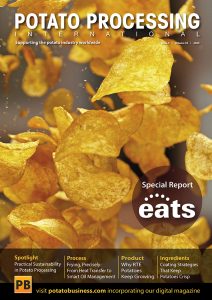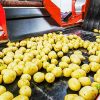Potato South Africa Reveals Insights on the Regional Market

The potato industry contributes 3% of the total gross agricultural product and 58% of total vegetable production in South Africa, according to a report of Potato South Africa, a non-profit organization which work to build a viable potato industry.
Total consumer spending on potatoes and potato products is estimated at between ZAR20bn (approx. USD1.52bn) and ZAR23bn (approx. USD1.75bn). The per capita consumption of potatoes is almost 40 kg and growing.
Between 50 000 and 54 000 hectares of potatoes are planted annually with a total production of between 2 million and 2.5 million tons during the last three years. Potatoes are grown twelve months of the year with approximately 80% under irrigation. The primary potato industry supplies work to an estimated 45 000 laborers (permanent and seasonal) on approximately 560 commercial potato farms. In 2011 the number of laborers were approximately 63 000 which means that potato producers are shedding labor. Eighteen thousand laborers lost their jobs on potato farms since 2011.
Furthermore, it is estimated that between 2 000 and 3 000 small holder farmers cultivate potatoes, meaning that 2 000 to 3 000 households produce potatoes for own consumption, and they are probably self-sufficient in terms of food security as they can easily realize between five to 30 tons of potatoes per hectare (i.e. they can also sell surplus production to generate income).
A panel of experts tasked with determining South Africa’s proposed National Minimum Wage (NMW) came to an amount of ZAR20 (USD1.5) per hour. They believed that this would not lead to job losses.
According to the panel extensive research showed that introducing a NMW could lead to economic growth. The panel also recommended a two year ‘’freeze’’ on the NMW to give companies and businesses enough time to introduce the transition. The agricultural and domestic sectors are given separate minimum wages to avoid job losses in these sectors.
A hectare of potatoes under irrigation can easily produce 50 to 70 tons of fresh food, meaning potatoes can make a significant contribution to food security. On average the potato producer in South Africa produces 47 tons of potatoes per hectare (average for dry land and irrigated land).
Recent studies have shown that out of the total consumer expenditure on staples (potatoes, maize meal, bread, rice and pasta), 10% is spend on potatoes, making potatoes part of the daily diet of consumers.
Potatoes South Africa mentions that it would like to see a value chain approach as the potato producer, the laborer and the informal trader (as well as many other role players, such as input suppliers) are dependent on one another. If a potato producer leaves the industry, not only will his seasonal laborers (and probably his permanent laborers as well) lose their jobs, but the related informal traders will probably not be able to source enough potatoes. Should the potato producer cut back on seasonal laborers in favor of mechanization, less money will be directed to mostly poor local communities.

















